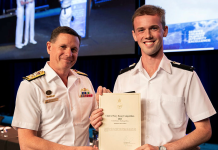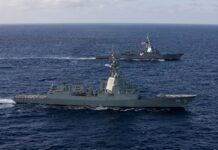By Allan Gyngell*
Everything Australia wants to do as a country depends on its ability to understand the rest of the world. To that end, governments can, have and should lead public opinion. I’m not pretending foreign policy can compete with Prince Harry and Meghan Markle for the front pages, but every piece of additional coverage is worthwhile. Because, as we make our way through what the Foreign Policy White Paper calls our ‘contested world’, it will be vital to bring the Australian public along.
“The well-being or destruction of civilisation rests precariously upon the ebb and flow of opinion and attitude among peoples torn with passion and prejudice, and with very ill-equipped knowledge”, wrote Sir Richard Boyer, former AIIA National President in 1947.
You might well see Brexit as a very contemporary example of passion, prejudice and ill-equipped knowledge.
If, Boyer continued, ”we are to make the leadership of the democracies effective, and to arm our governments with adequate support for wise and noble policies, it is important that we recognise that international affairs are enormously involved and require more than passing thought for adequate judgement.”
Academic writers distinguish between three different sorts of public opinion dealing with foreign affairs.
The first is a collection of what they term ‘issue publics’ or interest groups. People who join together for a particular purpose, to advance a cause they believe in.
You can think here of groups like ICAN , the antinuclear weapons coalition that has just won the Nobel Peace Prize; of human rights groups like Amnesty International; of the scores of aid organisations working through the Australian Council for International Development; of trade organisations like the Australia-China Business Council; or groups promoting links with a particular country, such as the Australia-US Leadership Dialogue.
A second, broader, group are the interested generalists – ‘the attentive public’ in the academic literature. These are the people who have a serious interest in the events of the world, who read the international pages of newspapers and blogs, listen to podcasts or radio programs and keep themselves informed.
The final group is the general public. It’s true that short of wars, terrorist threats and high-profile consular cases, most voters have little interest in the technicalities of foreign policy. That’s not surprising. Foreign policy doesn’t lend itself to clear storytelling. Much of its work is elusive and incremental and happens behind closed doors and over time. It’s the work of persuasion.
Communiques? Credentials? Conferences of the Parties? Eyes glaze. In any case, most Australians have no need to master the fine details of territorial claims in the South China Sea, or factional disputes in Lebanese politics. But the influence of this group on Australian foreign policy is nevertheless deep and important.
John Howard, for example, writes in his memoirs that a change in the public mood was the reason his government shifted its position on climate change. Prime Minister Howard also used to say that Australians wanted a foreign policy that was ‘practical and realistic’, and all the data suggests he was right.
For 13 years the Lowy Institute has been delivering us an invaluable survey of the way Australians think about foreign policy, allowing us to chart its changes. That polling shows that we are a pragmatic people, more confident about the world than many other Western societies, although anxiety is rising here as elsewhere, as the latest Scanlan Foundation Survey shows.
Public consultations conducted for the preparation of the Foreign Policy White Paper found very similar results. “Australians are resilient and optimistic, not easily frightened by the prospect of change in the international environment”, but they anticipate a “complex and potentially volatile world”, the government reported.
The public’s views can be subtle. For example, Australians have long drawn a distinction between their attitude towards the United States alliance and what they think about particular American presidents. And although apprehension about China is growing, most people see China as more of an economic partner than a security threat.
If there is a downside to all this positivism, though, you find it in our neighbourhood. Indonesia remains the biggest anomaly. Little more than one quarter of Australian respondents agree that Indonesia is a democracy, a five point fall from 2015. That is a very large and worrying knowledge gap which reflects a long history of ignorance and suspicion.
Yet, in the end, the importance of the general public for Australian foreign policy stems not so much from what they think about particular issues in the world but from what they think about Australia. Are they confident about their country or worried? Do they think we should be open to the world or closed? How do they imagine themselves?
The way Australians answer these questions can either support or undermine the complex foreign policy framework that sits on top. Governments can, have and should lead public opinion, but that leadership has to embrace these large questions of identity. Every Prime Minister knows that, and you’ve seen it most clearly recently in Keating, Howard and Abbott. It’s there again in the Turnbull Government’s white paper.
Those identities, which can often coexist, have changed greatly over the years. At various times, Australians have seen themselves as builders of the British Empire, representatives of a beleaguered white race in a sea of Asians, a pillar of the West in a global cold war against communism, a loyal American ally, a successful multicultural society seeking its future in Asia or a model international citizen.
There’s another complication with this. The people making these decisions about our identity are continually changing, And now more rapidly than ever. The proportion of Australia’s population born overseas is higher than it has been for 120 years. Six million of us. So the debate about our identity, and therefore our foreign policy, will now be conducted by a very different Australian society. A new generation of policymakers, whose experience and memories don’t go back much before the turn of the century, and who have never known an unconnected world, will soon be in charge.
The millennials and the migrants will understand the past—and therefore imagine the future—in new ways. They will be less inclined to see geography as predicament and less given to thinking about themselves as regional outsiders. They need to be drawn into the discussion.
In some ways, the job of informing the public is getting harder as the media environment splinters. Mainstream newspapers, radio and television stations are cutting back ruthlessly on overseas correspondents and specialist journalists while social media algorithms deliver us the reinforcing views we apparently crave. But on balance the news is good. The same technologies provide members of the attentive public with new opportunities to access and retrieve information about what is happening in the world and explore its dimensions.
I believe that everything Australia wants to do as a country—everything, from maintaining our health system to protecting our security—depends on our ability to understand the world outside and to act in it in ways that protect our interests and our values. Our objective is to ensure that Australia is never forced or coerced along particular paths; that in the constant flux of global change, choices are always available to us.
The most important role of the AIIA in this endeavour is as a transmission belt, linking the community to the decision-makers in government. So our next challenge is to make sure that we continue to represent that whole community, to draw new members of the Australian public into our discussion; to turn more members of the general public into the attentive public.
The AIIA is precluded by its charter from saying what should be done. That is one of our strengths. But we have a heavy responsibility, in the words of Richard Boyer, to leave our mark “to some good purpose on the actual turn of events”.
The need has never been greater.
This is an edited extract of the 2017 Charteris Oration presented by Allan Gyngell at AIIA NSW on 29 November 2017. The full transcript of the speech can be found here.
* Allan Gyngell AO FAIIA is president of the Australian Institute of International Affairs and author of ‘Fear of Abandonment: Australia in the World Since 1942’.
Republished with permission of the Australian Institute of International Affairs.



